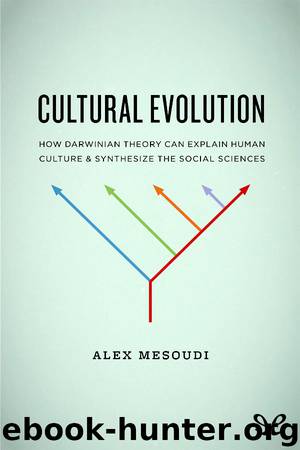Cultural Evolution by Alex Mesoudi

Author:Alex Mesoudi [Mesoudi, Alex]
Language: eng
Format: epub
Tags: Ensayo, Ciencias sociales
Publisher: ePubLibre
Published: 2011-01-01T05:00:00+00:00
Objections to Cultural Evolutionary Analyses of History
It is important to recognize that the research described in this chapter and the previous one is in the most part entirely compatible with traditional, nonevolutionary research in the social sciences and humanities. Indeed, in many cases social scientists have come up with informal methods, such as the linguists’ comparative method or the manuscript scholars’ stemmata, that are implicitly based on the same logic and assumptions as those that evolutionary biologists work with. And many of the findings obtained using evolutionary methods match well with what traditional scholars have already found, such as the broad topology of the Indo-European language family, the link between patriliny and cattle, or the likely identity of the oldest Canterbury Tales manuscript.
However, the real value of biologically derived phylogenetic methods and dynamical models lies in their rigor. Whereas linguists and manuscript scholars build their historical trees based on intuition, biologists and cultural phylogeneticists use quantitative statistical methods such as maximum likelihood or Bayesian inference to generate trees using explicit and exact criteria and with a known degree of statistical certainty. While cultural anthropologists draw comparisons across societies in order to explain systematic patterns of cultural variation (at least until social constructionism made cross-cultural comparisons unpopular), these comparisons are vulnerable to Galton’s problem unless phylogenetic methods are used to distinguish between similarities due to descent and similarities due to independent convergence. And while historians propose informal theories to explain historical trends, such as Collins’s geopolitical theory of empire decline, such theories can only be adequately tested using quantitative, population-based evolutionary models, which showed this particular theory to be incapable of explaining actual historical dynamics.
Despite the value of evolutionary methods, and the potential complementarity with existing social science research, I suspect that the majority of archaeologists, anthropologists, linguists, and historians will remain skeptical of such methods. Two common objections are that culture is too complex to be analyzed using simple evolutionary models, and that specific cultural phenomena (e.g., languages, empires) cannot be meaningfully compared with one another.
Objection 1: Culture Is Too Complex for Simple Evolutionary Models. Many social scientists often argue that cultural change is too complex to be reduced to the simple mathematical models described above, such as neutral drift or population dynamical models. Here is a typical response to cultural evolutionary models from a historian, Joseph Fracchia, writing with biologist Richard Lewontin:
Download
This site does not store any files on its server. We only index and link to content provided by other sites. Please contact the content providers to delete copyright contents if any and email us, we'll remove relevant links or contents immediately.
Sapiens: A Brief History of Humankind by Yuval Noah Harari(14389)
Sapiens by Yuval Noah Harari(5370)
Pale Blue Dot by Carl Sagan(5008)
Homo Deus: A Brief History of Tomorrow by Yuval Noah Harari(4918)
Livewired by David Eagleman(3774)
Origin Story: A Big History of Everything by David Christian(3692)
Brief Answers to the Big Questions by Stephen Hawking(3435)
Inferior by Angela Saini(3314)
Origin Story by David Christian(3201)
Signature in the Cell: DNA and the Evidence for Intelligent Design by Stephen C. Meyer(3138)
The Gene: An Intimate History by Siddhartha Mukherjee(3098)
The Evolution of Beauty by Richard O. Prum(2997)
Aliens by Jim Al-Khalili(2829)
How The Mind Works by Steven Pinker(2816)
A Short History of Nearly Everything by Bryson Bill(2698)
Sex at Dawn: The Prehistoric Origins of Modern Sexuality by Ryan Christopher(2529)
From Bacteria to Bach and Back by Daniel C. Dennett(2484)
Endless Forms Most Beautiful by Sean B. Carroll(2483)
Who We Are and How We Got Here by David Reich(2437)
